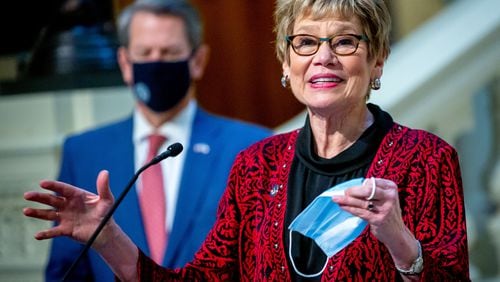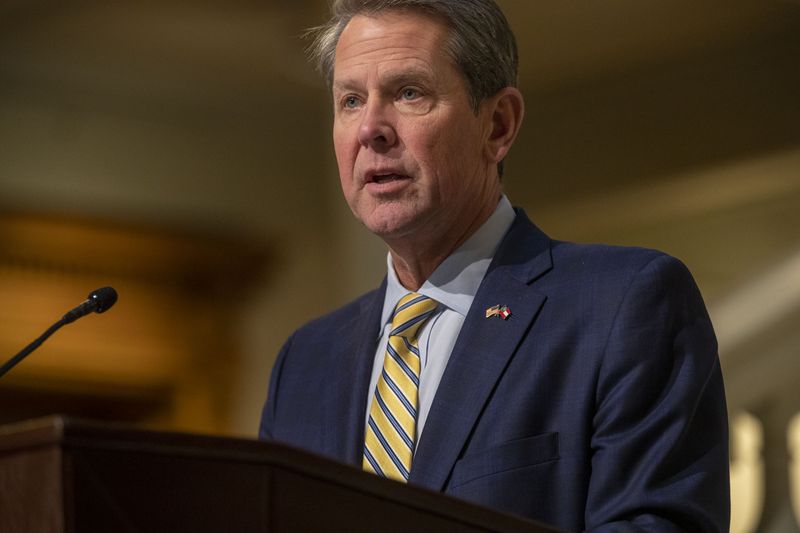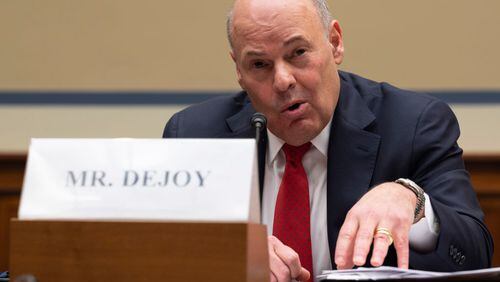Appearing before state lawmakers last week, Georgia’s public health commissioner acknowledged the strain on her agency from the coronavirus pandemic.
“This,” Dr. Kathleen Toomey said, “is probably the most challenging thing all of us have ever done.”
But Toomey wasn’t seeking state money to expand laboratory capacity at the Department of Public Health. Or to replace its decade-old disease-tracking system. Or to hire more epidemiologists, scientists and other specialists who could help contain not just this coronavirus but whatever public health crisis emerges next.
Amid a pandemic that, as of Monday, has killed 11,584 Georgians and sickened more than 720,000, Toomey’s boss, Gov. Brian Kemp, proposed only a minuscule increase in the state’s public health budget for the next fiscal year: about $900,000, or 3/10 of 1%. None of the new money addresses the pandemic. But nearly $200,000 would fund a licensing program for tattoo parlors.
Kemp’s budget plan continues a long-established trend in Georgia. If lawmakers follow his recommendations, the state will spend 13% less per resident on public health in the coming year than it did a decade ago.
“It assumes this will be a short-term problem, and the federal government will be there to pay for it,” said Amber Schmidtke, a public health researcher who has worked at the Centers for Disease Control and Prevention and taught at Mercer University.
“It’s clear,” Schmidtke said, “that the leadership of this state for many years has not prioritized public health.”
In a news conference on Jan. 12, Kemp said the agency is adequately funded to respond to the pandemic through testing and vaccinations.
“We have the bandwidth to do what we need to do,” Kemp said. “We will use every resource, human and financial.”
Georgia ranks 37th among the states in public health spending per resident. It advanced from 39th over the past decade only because of budget cuts in other states.
“It assumes this will be a short-term problem, and the federal government will be there to pay for it."
Most years, almost three-fifths of Georgia’s public health budget comes from the federal government, most of it through grants administered by the CDC. In recent years, Congress has cut the CDC’s budget, shrinking the grants to Georgia and other states.
During the pandemic, Georgia has relied even more heavily on federal money. Since last spring, the state has collected a little more than $1 billion in additional federal funding, which has paid for such virus-related expenses as private laboratory testing, operations of the state’s labs, temporary “surge” staffing, personal protective equipment and an isolation unit for people who contracted the coronavirus. The federal money also covered expenses by the state’s 159 county health departments, which normally depend on state appropriations.
Credit: Alyssa Pointer / Alyssa.Pointer@ajc.com
Credit: Alyssa Pointer / Alyssa.Pointer@ajc.com
“When the federal money goes away, it’s effectively going to be a cut for local health departments,” said Laura Harker, the senior policy analyst for health care at the Georgia Budget and Policy Institute, a left-leaning nonprofit research group. “They continue to have growing needs, year to year.”
Demands on the local health agencies, and on Georgia’s public health system in general, have increased in recent years. Public health advocates have long complained about inadequate funding for AIDS/HIV prevention, controlling chronic illnesses and other needs.
“We have the bandwidth to do what we need to do. We will use every resource, human and financial."
Few lawmakers have acted on those complaints, frequently cutting state spending on public health along with other areas of state government.
But Rep. Rebecca Mitchell, D-Snellville, an epidemiologist who was elected in November, said the pandemic shows public health should be a greater priority.
“I appreciate public health scientists enough to know they can’t work unfunded miracles, even though they’re heroes,” Mitchell wrote on Twitter last week.
In a later tweet, she urged “more support” for the public health agency. “This is a problem of funding.”
Schmidtke, the public health researcher, said in an interview that agency employees have told her morale is low as the pandemic drags on into a second year. Many work virtually nonstop, she said, and need reinforcements.
“You can’t do that without money,” she said.
Toomey should make a stronger case for boosting her agency’s resources, Schmidtke said, even though she works for a fiscally conservative governor who campaigned on cutting government spending.
“She’s in a tight spot,” Schmidtke said. “She’s a political appointee.”
However, “I don’t know she’s really advocating for her people when she tells the people who control the purse strings that her people don’t need any more money.”
During legislative budget hearings on Jan. 19, Toomey didn’t discuss her agency’s spending plan until about 45 minutes of her scheduled one-hour appearance had elapsed, detailing vaccination plans and other pandemic issues. Rather than more money, she said, the agency’s employees need thanks for the work they’ve done and a break from relentless criticism.
“Social media has made responding to the pandemic extremely difficult for all of us,” Toomey said.
She also deflected questions about funding during Kemp’s news conference earlier in the month. But she acknowledged her agency doesn’t have enough employees to execute a widescale vaccination program, and she appealed for volunteers to help.
“This can’t be public health doing this alone,” Toomey said.
“This is going to work,” she added, as if partly to convince herself, “and it’s going to work well.”








